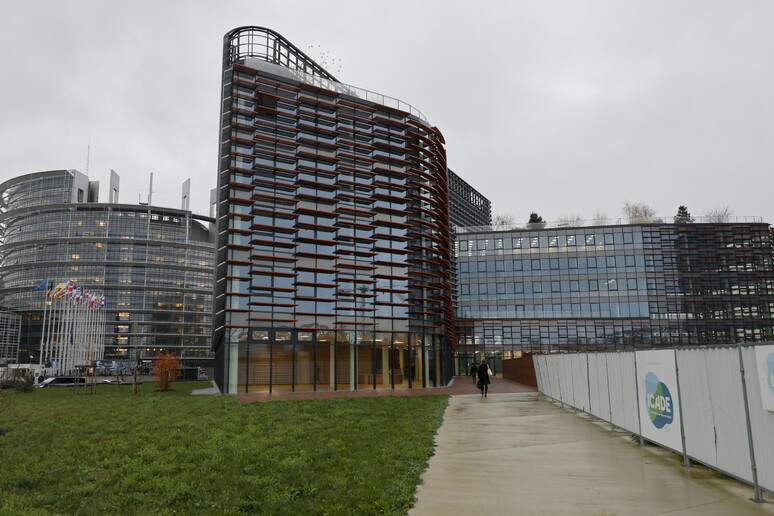EU funds are being siphoned off
through corruption, fraud and abuse - from fake jobs to forged
invoices. According to the latest report by the European Public
Prosecutor's Office (EPPO), the misuse of EU money remains
widespread across the 27-nation bloc.
From "Qatargate" and "Huaweigate" to the recent conviction of
Marine Le Pen for embezzling EU funds, high-profile scandals -
all playing out at the European Parliament - have put corruption
within the European Union and its institutions in the spotlight.
Twenty people were charged in the "Qatargate" case in 2022. EU
lawmakers were accused of taking huge bribes to promote the
interests of Qatar and Morocco - something both countries deny -
but the case is weighed down in legal challenges with no trial
in sight.
More than two years later, an investigation into Huawei came to
light. Eight people have been charged in early April in a probe
into suspected corruption in the Parliament involving the
Chinese tech giant. They are being accused of active corruption,
money laundering and participation in a criminal organisation,
the Belgian federal prosecutor's office said amid ongoing
investigations.
Meanwhile, France's far-right National Rally (RN) leader Marine
Le Pen was convicted by a French court on March 31 over an
estimated 2.9 million Euro scheme to take advantage of European
Parliament expenses to employ assistants who were actually
working for her party in France between 2004 and 2016. Le Pen
has denied any wrongdoing.
Hopes to prevent new cases in the European Parliament - or any
EU institutions for that matter - rose after a common ethics
body was agreed upon in early 2024 to help with enforcement and
boost accountability across EU institutions. It has however
become bogged down in a political fight.
Additionally, a European Court of Auditors report on Monday said
the allocation of EU funds to non-governmental organisations
(NGOs) is not transparent - further fuelling concerns over the
use of EU funds, with public interest in transparency growing in
the wake of the Qatargate scandal.
The picture gets all the more murky as the EU seeks to challenge
democratic backsliding from Türkiye to Hungary and assert itself
as a bulwark against the might-is-right worldview of US
President Donald Trump.
What is "Huaweigate"?
In the latest scandal rocking the Parliament since mid-March,
investigators are looking into possible embezzlement or gifts
offered by Huawei representatives or lobbyists to MEPs to defend
its interests in the deployment of 5G telecommunications
technology.
Around 100 police officers searched 21 homes in Brussels,
Wallonia and Flanders in mid-March, and detained seven lobbyists
linked to Huawei. Belgian prosecutors said the alleged
corruption dated from 2021 to the present.
Chinese technology in Western mobile communications has been a
hot topic of discussion for years. Critics of Huawei fear that
China could gain access to mobile networks through the company.
Huawei however stressed that it has a zero-tolerance policy on
corruption. "As always, we are committed to complying with all
applicable laws and regulations," it said.
Parliament authorities, meanwhile, say they are "fully
cooperating" with the Huawei probe. Soon after the scandal broke
out, the European Parliament banned lobbyists working for Huawei
from entering its premises.
And who's involved?
One of the main suspects is Belgian-Italian Valerio Ottati,
Huawei's EU public affairs director. Seven other lobbyists have
been charged, but the investigation is ongoing and the full list
of individual suspects has not been publicly disclosed.
At the centre of the investigation is a letter sent to the
European Commission defending the Chinese tech giant's interests
in Europe, in particular the deployment of the 5G mobile
network. Eight MEPs signed the letter.
Prosecutors said Huawei paid two intermediary companies to
funnel payments to MEPs in return for signing the letter.
Portuguese lobbyist Nuno Wahnon Martins, along with Ottati, is
suspected of authoring the letter.
The Belgian authorities believe that Martins issued two
"fictitious" invoices, totaling 45.950 Euro, to a Belgian design
company and a British events company, which in turn received
significant amounts from Huawei Technologies Belgium before and
after the letter was sent to the Commission.
Martins was also an adviser for the Italian MEP Fulvio
Martusciello between 2015 and 2019. Martusciello is one of the
MEPs linked to the letter that was allegedly used to try to
influence the Commission's decisions.
The former Slovenian conservative MEP Franc Bogovič was also
mentioned in an article by the investigative journalism platform
"Follow the Money", but is currently not a suspect in the probe.
In 2019, Bogovič moderated a panel on cybersecurity organised by
a Huawei lobbyist and in 2016 visited Huawei's offices in
Ljubljana. He denied any involvement in the Huawei scandal.
Series of scandals blow to EU public trust
The newly established EU ethics watchdog said the succession of
scandals "damage public trust in the EU".
While the aforementioned scandals continue to shake the
democratic core of the European Union in Brussels, the misuse or
embezzlement of EU funds across the bloc is nothing new.
Last week, the European Public Prosecutor's Office (EPPO) and
their local counterparts searched the Croatian Foreign Ministry
as part of a probe into the alleged illegal use of funds.
(continues)
ALL RIGHTS RESERVED © Copyright ANSA











